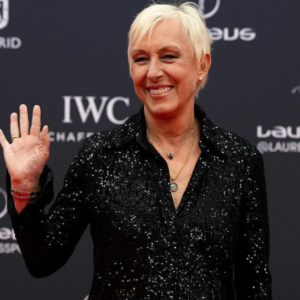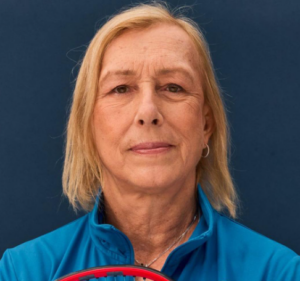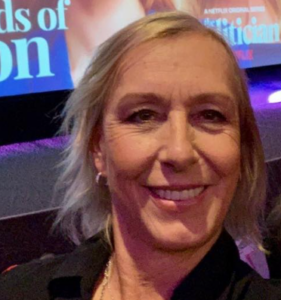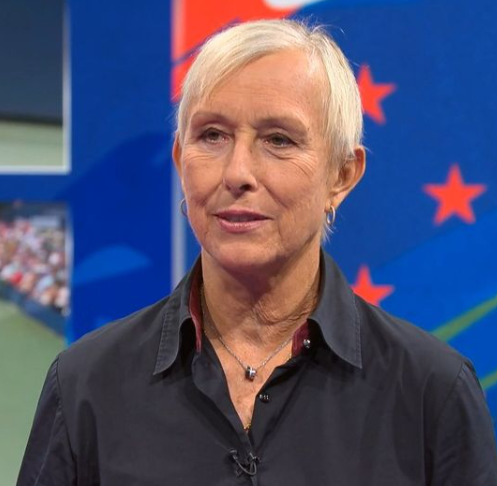Martina Navratilova’s career was defined not just by her remarkable success in tennis but by her courage to live authentically as an LGBTQIA+ athlete
Her public coming out in the early 1980s, her critique of the sports world’s double standards, and her unwavering advocacy for equality have cemented her as a trailblazer both on and off the court.
Navratilova’s legacy is one of resilience, advocacy, and leadership. Through her continued work for LGBTQIA+ rights, she has left an indelible mark on the sports world and inspired generations of athletes to embrace their identities unapologetically.
As sports continue to evolve, Navratilova’s contributions will remain a powerful force in the fight for inclusion and acceptance for all.
Today, as Navratilova enjoys life with her wife Julia Lemigova and their adopted children, her legacy is more than just her tennis achievements—it’s the example she set for others to follow.
Through her activism and authenticity, she has left an indelible mark on both the sports world and the global fight for LGBTQ+ equality.

Table of Contents
Martina Navratilova’s Impact on LGBTQIA+ Awareness in Sports
Martina Navratilova, one of the greatest female tennis players of all time, has not only made waves on the court but also off it with her advocacy for LGBTQIA+ rights.1
Her personal experiences as an openly gay athlete have made her an outspoken critic of the double standards and discrimination in the sports world.
Navratilova’s openness about her sexuality, particularly in the 1980s when coming out was even more taboo, has paved the way for future generations of athletes.
Her life serves as a vital example of the challenges that LGBTQIA+ athletes face, particularly women, who are often subjected to more scrutiny and stereotypes than their male counterparts. Navratilova’s voice in this fight is one of courage and resilience.
Facing Double Standards in Tennis
Navratilova’s experiences highlight the double standards that exist in the treatment of male and female athletes regarding their sexual orientation.
In a 2010 interview with The Guardian, she opened up about the stark differences in how society views gay male and female athletes, stating, “It hardly occurs to anyone that sportsmen are gay. But with women, they almost have to prove they are straight.”
This observation reflects a broader societal issue, where female athletes, particularly in sports like tennis, are often subject to assumptions about their sexuality based on stereotypes.
Navratilova noted how male athletes, except perhaps figure skaters, are rarely questioned about their sexual orientation. In contrast, female athletes, especially those excelling in male-dominated sports, face undue pressure to “prove” their heterosexuality.
This double standard places additional strain on female athletes, forcing them to navigate not only their professional careers but also public perceptions of their personal lives. For LGBTQIA+ female athletes, these stereotypes can be especially harmful, leading to discrimination and a lack of support.

Martina Navratilova: Critique of the Sports World’s Tolerance of Homophobia
Navratilova has never shied away from speaking out against the systemic issues that perpetuate homophobia in sports.2
One of her most critical points was the lack of accountability in addressing homophobic behavior compared to other forms of discrimination.
In the same Guardian interview, she explained that while there is a near-zero tolerance policy for racism, sexism, or antisemitism in sports, the same standard is not applied to homophobia.
Navratilova expressed frustration that anti-gay slurs and bigoted language are often met with indifference or brushed aside, saying, “it seems like it is zero tolerance of all other bigoted crap, and 95% tolerance of anti-gay stuff.”
Her call for change is one that resonates across all sports, not just tennis. For Navratilova, the issue is not merely about protecting LGBTQIA+ athletes from abuse but about creating an environment where their contributions are respected and their identities honored without fear of retribution.

The Role of Leadership in Fostering Change
Navratilova also emphasizes that real change in combating homophobia in sports must come from leadership. She believes that organizations, governing bodies, and team executives must set the tone for inclusivity and intolerance of bigotry.
To Navratilova, enforcing strict policies that prevent homophobic behavior is not only a moral obligation but a necessary step to create a more welcoming and diverse environment for athletes. As she once stated, “They don’t allow antisemitic rants or whatever racist bulls*it to be shouted from the stands, and they should not allow the homophobic stuff.”
By holding fans, coaches, and athletes accountable for their actions and words, sports organizations can ensure that LGBTQIA+ athletes feel supported and safe in their careers. Navratilova believes that strong leadership is vital to this process, as these actions set an example for others to follow.
Continuing Navratilova’s Fight
Despite the progress made, Navratilova’s fight for LGBTQIA+ equality in sports is far from over. While there are more openly gay athletes today than ever before, the stigma surrounding LGBTQIA+ identities still persists, especially in male-dominated sports.
Navratilova’s call to action for sports organizations to address homophobia must continue to be a priority for all who care about equality in athletics. With more players coming out, the need for protective policies and inclusive cultures in sports has never been greater.
Ultimately, Navratilova’s advocacy serves as a reminder that while sports can be a unifying force, they must also reflect the diversity and inclusiveness of society. As long as discrimination continues to rear its head, the fight for equality in sports will need champions like Martina Navratilova.

Also Read: Alex Michelsen’s Djokovic-Style Behavior Sparks Outrage, Tennis Controversies and More
Martina Navratilova: Breaking Barriers On and Off the Court
Martina Navratilova is widely regarded as one of the greatest tennis players of all time, but her impact extends far beyond her achievements on the court.3
In addition to her 18 Grand Slam singles titles and 31 major doubles titles, Navratilova has been a trailblazer for LGBTQ+ rights and gender equality.
Her journey of self-discovery, coming out, and embracing her identity has been both courageous and inspirational for millions around the world.
The Pressure of the Spotlight
For athletes in the public eye, personal decisions often become public matters, whether they like it or not.
Navratilova, who dominated women’s tennis in the late 1970s and 1980s, has spoken openly about the intense pressure she faced when she came out as a lesbian. In an interview with The Guardian, she shared the complexity of living in a world where every move was scrutinized.
“I am a role model for kids who look up to me, and to the game. But then I do something that the press picks up on, and straight people say, ‘Oh, that’s what those dykes are like,'” she explained.
This statement reflects the unique challenges that LGBTQ+ athletes face. Being in the public eye means their personal lives often become symbols for the larger LGBTQ+ community, whether they intend them to be or not.
In Navratilova’s case, her status as a tennis legend meant that her private life was subject to more scrutiny, and her every move, both on and off the court, was dissected.
Thank you Liz Cheney!!! And I never thought I would at that… https://t.co/C3gl5cBcgN
— Martina Navratilova (@Martina) September 5, 2024
The Struggle to Come Out
“Coming out to the world is not easy,” Navratilova said during the interview. For many LGBTQ+ individuals, the decision to come out is deeply personal and filled with challenges, ranging from fear of judgment to potential ostracism.
For public figures like Navratilova, the stakes are even higher. She described the dilemma many face: the desire to live openly and authentically while fearing how the world might react.
“If I have a girlfriend, then I don’t want to come out to the world – I wanna introduce her to my friends and family and see how it goes, you know? It is not because I am hiding,” she added.
This sentiment resonates with many LGBTQ+ individuals, even today. The act of coming out is not necessarily about hiding but rather about finding the right moment to share one’s truth. For someone in the limelight, the challenge is intensified, as privacy becomes a luxury.

Martina Navratilova: Facing Backlash and Prejudice
- Coming out publicly, however, was not without its challenges. Navratilova faced significant backlash from sections of the media, fans, and the sports community.
- As she mentioned in her interview, her personal life became fodder for gossip, and every misstep was attributed to her sexuality.
- The media’s fixation on her sexual orientation often overshadowed her athletic accomplishments.
- She faced hostile headlines, uncomfortable questions, and judgment from fans who could not separate her personal life from her career.
- Even though she was dominating the tennis world, the conversation often shifted to her sexuality rather than her skill on the court.
- Despite the challenges, Navratilova remained unflinchingly committed to being her authentic self.
- Over time, she became an outspoken advocate for LGBTQ+ rights, using her platform to challenge discrimination in sports and beyond.
A Champion for LGBTQ+ Rights and Gender Equality
As an athlete who fought both on the tennis court and in the court of public opinion, Navratilova has long been an advocate for equality.
She has used her platform to call attention to issues of sexism, homophobia, and transphobia. Throughout her career, she has emphasized the importance of representation, not just in sports but in all areas of life.
Navratilova’s advocacy work goes beyond LGBTQ+ rights. She has also spoken out on issues related to gender equality in tennis, such as the disparity in prize money between male and female players. Her activism reflects her belief that sports should be a space where all athletes, regardless of gender, sexual orientation, or background, have the opportunity to thrive.
The Personal Becomes Political: Navratilova and Lemigova
Navratilova has found personal fulfillment in her relationship with her wife, Julia Lemigova, a former Russian model.
The couple, who have been married for nearly a decade, exemplify the power of love and resilience in the face of adversity. Their relationship has been a source of inspiration to many, showing that true love knows no boundaries.
In August 2024, the couple expanded their family by adopting two young boys, further showcasing their commitment to building a loving, supportive environment for their children.
The joy of family life has been an essential part of Navratilova’s journey, providing her with a sense of stability and purpose.
View this post on Instagram
The Ongoing Fight for Representation in Sports
Navratilova’s legacy is not only defined by her incredible achievements on the tennis court but also by her tireless work to break down barriers in sports.
She paved the way for future generations of LGBTQ+ athletes to compete without fear of discrimination. Her courage to live authentically has influenced athletes like Megan Rapinoe, Jason Collins, and Michael Sam, who have followed in her footsteps as openly LGBTQ+ figures in sports.
However, despite significant progress, the fight for LGBTQ+ representation in sports is far from over. Navratilova continues to speak out on issues of inclusion, particularly for transgender athletes.
Her stance on transgender participation in women’s sports has sparked debate, but she remains a critical voice in ongoing discussions about fairness, equality, and representation.
Also Read: Zeng Jian vs Sreeja Akula – Paris Olympics 2024 Table Tennis Preview




